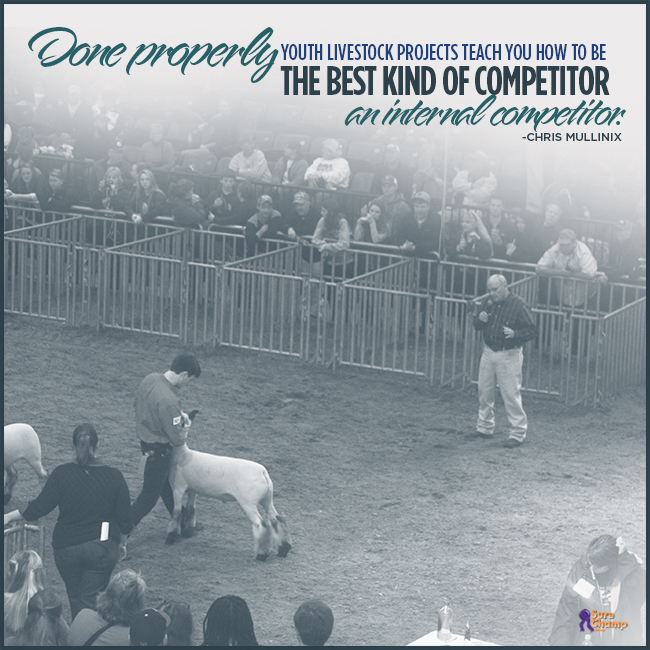
You enter the show ring. Your heart beats faster, and your palms become sweaty. There is a hush as the judge places the class, and you feel the pressure of all your hard work and preparation mount. You will either experience a natural high by placing at the top of the class, or the feel like the wind has been let out of your sails if you are at the bottom.
Show ring competition provides a gamut of emotions to many exhibitors. The emotional investment in your performance might affect the rest of your day. But is this healthy? Does showing livestock breed the spirit of competition, in a healthy environment, that allows young people to learn, thrive and become a better person?
Yes. And, experts and industry leaders also agree.
According to John Tauer, a psychology professor at the University of St. Thomas, quoted in the New York Times, eliminating good, old-fashioned competition is not realistic.
 “Not everybody gets to be a doctor, he states. “You don’t get away from competition unless you go to a system where everybody gets to do what they want whenever they want.”
“Not everybody gets to be a doctor, he states. “You don’t get away from competition unless you go to a system where everybody gets to do what they want whenever they want.”
In a series of studies over a five-year period, Tauer researched how children ages 9 to 14 performed shooting free throws in three situations that included direct competition, cooperation and cooperation combined with competition. The combination of cooperation and competition, similar to that found in showing livestock, resulted in greater satisfaction and often in higher scores.
“Kids prefer the combination of competition and cooperation. It’s a significant increase in enjoyment,” Tauer says.
Chris Mullinix, Kansas State University livestock judging coach, is a strong believer in competition to develop life skills. He says healthy competition helps young people manage time, set goals and develop work ethic as they work toward those goals. In the process, young people are sometimes gratified by the outcome and often disappointed. Mullinix says how a young person learns to deal with both these circumstances is also valuable.
“In athletics or academic competition there is often a “road map” to success,” he says. “My involvement with livestock projects taught me that some things in life aren’t an exact science. I love competition. But most contests of skill will be conquered by those who were blessed with God’s gifts to be successful in that arena. Not showing livestock. In this contest those who want it the most can achieve the most.”
Mullinix says in contrast to other activities, livestock competition is a moving target. Each show has a different judge that may have a vastly different opinion than the previous evaluator. As a result, he says showing livestock made him a better person because it taught him to focus on the things he could control rather than on things that were out of his control.
 “Done properly, youth livestock projects teach you how to be the best kind of competitor – an internal competitor,” Mullinix says. “The kind that is driven to make themselves better rather than the kind that is driven by the thought of beating someone else.”
“Done properly, youth livestock projects teach you how to be the best kind of competitor – an internal competitor,” Mullinix says. “The kind that is driven to make themselves better rather than the kind that is driven by the thought of beating someone else.”
David Johnson, a professor emeritus of educational psychology at the University of Minnesota, has done pioneering work on the conditions that make competition enjoyable and enhance performance. He says one way to change the culture around winning is to have one child or livestock exhibitor know how and when to encourage other children. Urging a child to recognize excellence and effort in others and to give shout-outs when they see them helps foster healthy competition in a super positive way.
“That way, he or she will be fostering a spirit of cooperation even in the midst of competition,” Johnson says. “And when that child loses as he inevitably will, he will receive encouragement in return. By taking an emphasis off winning and putting it on mastery, the individual and the team, classroom, county, world, etcetera will grow in the process.”
Mullinix adds that the entire world is competitive, especially when it’s time to seek out or land a great job. He says it would be a disservice to the next generation of young people if adults did not push them to participate in programs that promote healthy competition. He knows the contest won’t always go perfect or as planned but neither, he says, does life. As a judging team coach, he says it’s his job to help support young people through disappointments that are bound to occur and look toward opportunities.
“Livestock competition helped me develop critical thinking, decision making and communication skills while improving time management and developing an outright passion for something that I took very serious,” Mullinix says. “It teaches young people to set goals and work their tails off to try and accomplish them. It teaches the life lesson of disappointment but at just the right moment it also gives you that moment of glory. Perhaps most importantly, it gives young people an opportunity to spend time with family and develop life-long relationships.”
Sources:
1) “The Competing Views on Competition,” By Matt Richtel, Oct. 8, 2012, Home & Garden, http://www.nytimes.com/2012/10/11/garden/the-role-of-competitiveness-in-raising-healthy-children.html?_r=0, January 24, 2016
2) Electronic interview with Chris Mullinix, Kansas State University, livestock judging team coach, January 28, 2016

